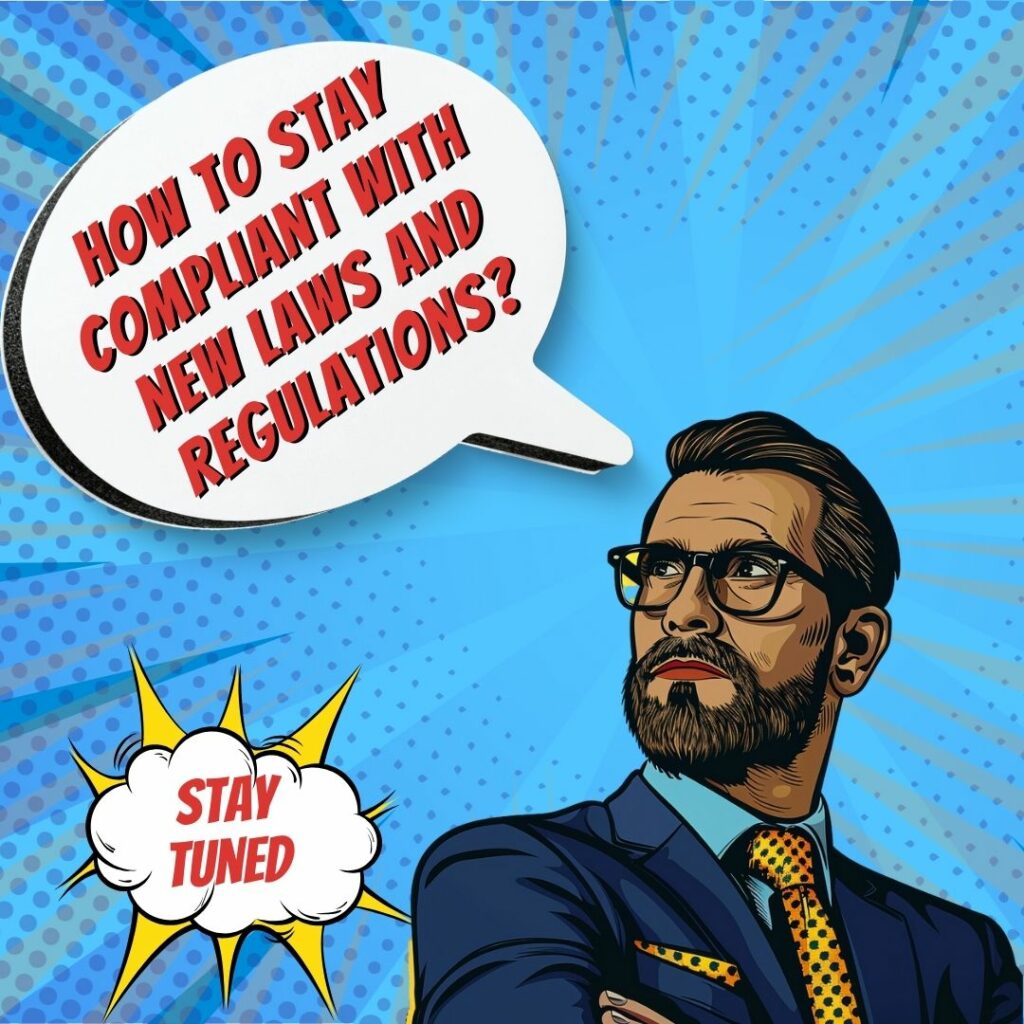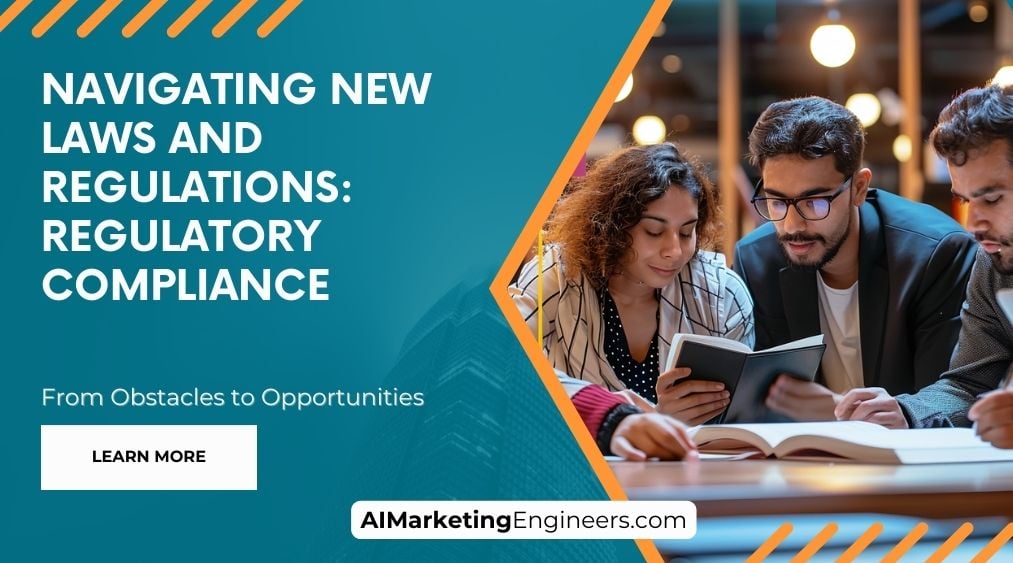Key Takeaways
✅ Stay Informed and Proactive: Staying ahead of regulatory changes is not just smart; it's necessary for your business's survival and growth. Did you know that non-compliance can lead to hefty fines, which can be a significant financial burden for any company? By creating a system that keeps you updated on new regulations in real time, and working closely with legal experts, you can avoid these pitfalls. Implementing such measures can save your business from unnecessary financial stress and maintain its reputation.
✅ Leverage Technology: The right technology can be a game-changer in managing regulatory compliance. Imagine tools that not only alert you to relevant regulatory changes but also provide a clear summary of how these changes impact your operations. Such technologies exist and are becoming increasingly sophisticated, thanks to AI. For instance, automated compliance monitoring tools can dramatically reduce the chances of oversight, and AI-driven assessments can ensure you're always on the right side of the law.
✅ Develop a Comprehensive Compliance Framework: A well-structured compliance framework not only sets the foundation for meeting current regulations but also prepares your business for future changes. Surprisingly, a significant number of businesses lack a formal policy in this area. Developing a global compliance framework that is flexible enough to adapt to regional variations is vital. Moreover, instilling a compliance-first culture within your organization ensures that everyone is on the same page, significantly reducing the risk of non-compliance.
 Introduction
Introduction
Are you feeling overwhelmed by the ever-changing compliance landscape? Navigating new laws and regulations has never been more challenging, but also, it's never been more critical to the success and sustainability of your business. The landscape of regulatory compliance is like a vast, ever-expanding universe with new stars – or in this case, laws and regulations – appearing all the time. Understanding the importance of regulatory compliance is the first step in safeguarding your business against potential legal pitfalls and fostering trust with your customers.
In a world where a single compliance misstep can lead to hefty penalties and damage your brand's reputation, staying ahead of the game is not just an option; it's a necessity. This article delves into modern strategies and tech solutions that promise not just to keep you in line with current regulations but also to optimize your approach for better operational efficiency. With insights into leveraging cutting-edge technology and developing a robust compliance framework, we're here to guide you through the maze of 2024's regulatory environment.
Expect to uncover actionable insights and groundbreaking information that will not only help you meet the regulatory demands of today but also prepare you for the challenges of tomorrow. We're here to turn what often seems like an overwhelming challenge into a strategic advantage for your business. Let's embark on this journey together and ensure that when it comes to regulatory compliance, your business is not just surviving, but thriving.
Top Statistics
| Statistic | Insight |
|---|---|
| At least 40 states and Puerto Rico introduced or considered at least 350 consumer privacy bills in 2023. | This highlights the rapid adaptation and response to consumer privacy concerns across the U.S., signaling a crucial pivot point for businesses in maintaining compliance. |
| Nine states (California, Virginia, Connecticut, Colorado, Utah, Iowa, Indiana, Tennessee, and Montana) have comprehensive data privacy laws. | Indicates a growing trend towards state-level action on data privacy, suggesting a patchwork regulatory landscape that businesses must navigate. |
| Several U.S. states are set to introduce or amend privacy laws in 2024, each with its own set of requirements and implications for businesses. | Forecasting changes and preparing in advance for these variances can be a strategic advantage for businesses looking to lead in compliance and consumer trust. |
| Businesses must be aware of implications in different jurisdictions, as privacy regulations in 22 U.S. states require thorough analysis of customer locations. | This stresses the importance of geo-specific compliance strategies, underscoring the complexity of legal adherence in the digital age. |
| New laws will continue to emerge, affecting business models and practices in the coming year. | Advises businesses to stay agile and informed, as the landscape for regulatory compliance is ever-evolving and can impact operations significantly. |
The Necessity of Regulatory Compliance
In today's world, regulatory compliance is not just a box to check off the list; it's a cornerstone of building and maintaining trust with your customers and the broader community. For businesses and individuals alike, navigating the complex landscape of laws and regulations is crucial to avoid costly legal troubles. But it’s not just about steering clear of fines; it’s about demonstrating your commitment to lawful practice and ethical operation. With laws constantly evolving, staying on top of these changes ensures your business not only remains compliant but also thrives. Penalties for non-compliance can be severe, impacting not just the financial health of a business but its reputation as well.
How to Access Local Codes and Ordinances
Ever wonder how you can stay in the loop with your community’s rules? It might seem daunting, but many local governments have partnered with third-party experts like Municode Codification to demystify this process. These partnerships mean that residents can easily find their community’s code of ordinances with just a few clicks online. Services such as CivicPlus go even further by creating online code libraries that keep users informed about the latest changes. This accessibility is key for both individuals and businesses looking to stay informed and comply with local laws.
Keeping Up with Legislation Changes
As our communities grow and change, so do the laws that govern them. Local governments tirelessly work to refine and update regulations, a process that directly affects both residents and businesses. By signing up for legislative alerts, staying informed becomes simpler. These alerts, along with comprehensive online portals, offer a streamlined way to get notifications about council meetings, amendments, and revisions. Such resources are invaluable for ensuring that the community can adapt to new regulations as soon as they are implemented.
Decoding Regulations and Planning for Remediation
Understanding the intricate details of regulations is paramount for businesses looking to implement them effectively. Beyond comprehension, businesses must be forward-thinking, identifying remediation opportunities for any unintentional violations. This proactive approach can substantially minimize penalties. Additionally, carrying out impact assessments and establishing solid data privacy practices form the backbone of a compliant operation. These strategies not only help businesses avoid legal pitfalls but also safeguard their reputation.
Navigating Cross-State Compliance
In an era where businesses often operate across state lines, understanding and adhering to the data privacy regulations of each state becomes a complex puzzle. The key to solving this puzzle is implementing robust data security measures, ensuring explicit consumer consent, and maintaining transparent communication channels for privacy rights. Moreover, regular updates to applications and systems are essential to meet evolving privacy and compliance requirements. Failing to navigate this complex landscape can lead to significant operational and legal challenges.
Oversight and Policymaking: Striking the Right Balance
A critical aspect of ensuring that laws and regulations serve their intended purpose lies in effective oversight and policymaking. It's a balancing act that congressional members engage in, aiming to prioritize quality over quantity in new laws. This focus on crafting well-considered, effective regulations is essential for their successful implementation. Proposals like the REINS Act underscore a commitment to increasing the democratic legitimacy of new regulations, highlighting the importance of thoughtful and inclusive lawmaking. This approach not only ensures the laws are practical but also reinforces their acceptance and adherence among the populace.
AI Marketing Engineers Recommendation
Recommendation 1: Invest in Compliance Training and Education Programs: With Regulatory Compliance constantly evolving, staying informed is your first line of defense. A recent survey indicated that over 60% of companies see compliance training as a top priority. Invest in comprehensive training programs for your team to ensure they’re up-to-date with the latest laws and regulations. By empowering your employees with knowledge, you not only mitigate risks but also foster a culture of compliance and responsibility.
Recommendation 2: Implement Data Protection and Privacy Measures: The rise of data breaches and stringent data protection laws like GDPR and CCPA highlight the importance of secure data handling. An IBM report found that the average cost of a data breach rose to $4.24 million in 2021. Implementing robust data protection and privacy measures isn’t just a compliance necessity; it’s a strategic move that protects your bottom line and customer trust. Audit your data policies regularly and ensure you're using encryption, secure data storage, and privacy-by-design principles in every aspect of your digital marketing efforts.
Recommendation 3: Leverage Regulatory Compliance Software: Navigating the complex world of regulations can be daunting, but you don’t have to do it alone. Regulatory compliance software tools are designed to simplify this task by keeping track of regulatory changes, managing your compliance documents, and even training your staff. Organizations using compliance management software have reported a 50% reduction in time spent managing compliance activities. By leveraging these tools, you can streamline your compliance processes, reduce the risk of non-compliance, and reallocate resources to other critical areas of your business.
Conclusion
In the intricate dance of regulatory compliance, staying ahead of the curve isn't merely about dodging legal bullets—it's a profound commitment to maintaining trust and integrity with the communities and customers we serve. Through this exploration, the importance of staying abreast with changing laws and regulations crystalizes not just as a defensive strategy but as a core business imperative. With local governments and agencies constantly updating codes to reflect the evolving needs and ensuring the safety of communities, access to resources like Municode Codification or CivicPlus becomes invaluable.
This article has navigated the intricate pathways of accessing local codes, understanding the impact of cross-state implications, and the unremitting importance of informed policy-making. It echoes the sentiment that in the rapid torrent of change, knowledge and proactive adaptation are your best allies. Recognizing the symbiotic relationship between robust regulatory frameworks and the fostering of community and consumer trust offers a lens to appreciate the daunting yet rewarding landscape of compliance.
As we march forward, let's anchor ourselves on the significance of building comprehensive data privacy practices, embracing the innovations in technology to stay informed, and leveraging strategic insights for compliance not as an afterthought but as a blueprint for sustainable growth. The call to action now is not just to adapt reactively but to lead with informed strategies and foresight. After all, navigating through the tangle of regulations with commitment and diligence paves the way for a future where trust, safety, and progress are in constant alignment.
FAQs
Question 1: What personal information does Regulations.gov collect?
Answer: Regulations.gov collects basic contact info like your name, email, and phone number, but don't worry, they keep your comments on the down low and don't let everyone see them.
Question 2: How are laws created and regulations developed?
Answer: Laws get made in the hustle and bustle of the legislative process. Regulations then come into play to make sure everything's ticking along nicely and in line with what the law wants.
Question 3: What are the key aspects of managing leave policies?
Answer: It's all about knowing the ins and outs of leave laws, whether it's for family, medical, or just some personal time off. Employers need to have clear policies, know the difference between paid and unpaid leave, and keep an eye on all the leave requests flying in.
Question 4: How can employers protect employee privacy and data security?
Answer: Tightening up cybersecurity, only letting a few trusted eyes on personal data, and making sure everyone knows the deal with privacy laws is the way to go. It keeps things secure and builds trust.
Question 5: What are the essential steps for implementing workplace health and safety standards?
Answer: Regular checks on what might go wrong, teaching everyone what they need to know to stay safe, making it crystal clear how to report problems, and having chats about safety keeps the workplace nice and secure.
Question 6: How can employers navigate discrimination and harassment laws?
Answer: Having solid policies that paint a clear picture of what's not okay, schooling everyone regularly on these matters, and making it easy to speak up about issues helps keep the workplace respectful and inclusive.
Question 7: How can HR professionals ensure compliance with new state and local laws?
Answer: Staying on top of which laws matter, keeping an eagle eye on compliance, and making sure all the hours worked are tracked correctly are key. And when in doubt, maybe getting a lawyer involved to help keep track.
Question 8: What are the key considerations for multistate employers?
Answer: They've got to juggle hours across different places, figure out if one sick leave policy fits all or if they need a few, and sort through the nitty-gritty of accrual rates and carryover details for their part-timers.
Question 9: How can employers stay updated on changing regulations?
Answer: Keeping tabs on regulatory websites, attending training sessions, and chatting with legal experts can help employers stay in the loop with the latest and greatest in regulations.
Question 10: What are the benefits of prioritizing compliance with new laws and regulations?
Answer: Staying on the right side of the law, creating a workplace where everyone feels supported, and dodging legal headaches are big wins. Plus, it makes for a happier, more productive crew.
Academic References
- Office of the Federal Register. (2020). Guide to the Rulemaking Process. This guide provides a concise overview of the process involved in the creation, interpretation, and application of federal regulations, focusing on the foundational aspects of regulatory history and the authority behind rulemaking.
- Kimble, J. (2012). Writing for Dollars, Writing to Please: The Case for Plain Language in Business, Government, and Law. Carolina Academic Press. This reference emphasizes the importance of clear language in regulations, offering insights into the nuances of reading and interpreting complex legal documents.
- Garner, B. A. (2016). Black's Law Dictionary. 10th Ed. Thomson Reuters. A pivotal resource for understanding the specific terminology and language used in legal documents, including regulations, which aids in precise interpretation and compliance efforts.
- Smith, S. E. (2019). Updating and Maintaining Compliance with Federal Regulations. Journal of Compliance Management, 21(3), 5-19. This article discusses the dynamic nature of federal regulations and the importance of regularly updating compliance processes to reflect current laws.
- Connor, T. O., & Fernandez, L. (2018). Legislative and Regulatory Drafting: Principles and Practices. LegalCraft Publishing. This book provides a comprehensive overview of the principles of drafting legislation and regulations, offering valuable guidance on organization, structure, and the drafting process itself.











